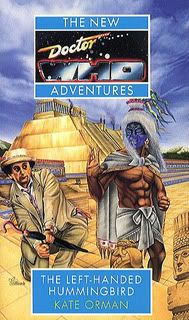
The Left-Handed Hummingbird by Kate Orman
In Brief: To defeat a malevolent psychic-force/Aztec God the Tardis-crew travel to Mexico in 1994 and 1487, London in 1968, New York in 1980 and finally boards the RMS Titanic. On the way the Doctor does a lot of magic mushrooms and LSD, Ace gets possessed and ends up in in a stabby mood and Bernice does some unfortunate things with a frying-pan.
And despite the cover the baddie is not bested through interpretive dance.
Again I have to start off by saying that there is no way that this book would have been published under the "Doctor Who" umbrella at any point after the 2005 "family audience" relaunch. Something this mature/adult would I imagine cause some major concerns. It goes to show how by the mid-90s the franchise was really being aimed at the older fans with an assumption that younger people wouldn't be interested. Here is a story where the Doctor truly suffers both physically and psychologically in battling his enemy.
All of the characters go through the ringer in this book. Kate Orman's interest in getting into the psychology of the characters (both new and old) means that we really get a view into what is happening below the surface. The Doctor in fighting the incorporeal "Blue" is forced to almost be mentally consumed by the being and we really understand what is at stake. Orman is even successful in making Ace functional and understandable. Rather than other authors who just see her as a toughened bitch we get the sense that she's the same character as before her "hiatus" from the Doctor, but has receded into an emotional shell (as represented by her continuing to wear her futuristic (skin-tight) body-armour whenever possible). Her love/hate relationship with the Doctor is also delved into, as she feels a responsibility and almost familial love for him, but is still hurt by his manipulations. This is a far cry from the Ripley/Sarah Connor wannabe we've seen in the past.
Bernice ends up being the middle-ground between the two. While not really able to get along with Ace she's aware that her presence at least calms the situation enough to allow the team to function. More and more she'd coming to the forefront as the main character of the series.
And what of the story itself? Orman's use of the narrative possibilities of time is the best so far seen in the series (and her writing style is fantastic, really using all of the possibilities of narrative fiction). We have a plot where the Doctor and co. meet the main characters after the later events of the book have already taken place (as in the book starts in 1994 but later they go back to 1968). The helps keep the main antagonist of "the Blue" feeling very much a threat, a presence that can suddenly appear and try to kill the regulars (or succeed with a selection of minor characters). It's also interesting (and very proto-River Song) having the Doctor encounter characters who in their time-stream have met him in his future (if that makes sense). Again it's something which is surprising to have never popped up in the original show, although I guess when the show was constrained to 25 minutes a week it was difficult to have massively complicated plotting.
Well until 1989: The Year That Confused Everyone that is. Although it's not like one would really ever feel challenged in watching modern fare such as "CSI: Whatever" or "House".
Another thing which the author does well is use Orman's thorough research and knowledge but in such a way to really add to the book (rather than other cases where it just seems to be there to show off). As with the (superb) 1964 story The Aztec society is one which in its reality is more alien than anything "seen" on other worlds. I couldn't imagine anyone, after reading the section set in pre-conquest Mexico, *not* going and at least researching the truly fascinating mythology and beliefs of that dead civilization. It's notable that while being very forward-looking Orman has picked up on Doctor Who's original partly-educational intent (this is before the Daleks appeared and got huge ratings).
So overall I have to say VERY GOOD BOOK IS VERY GOOD. It's definitely up in the Top 5 of what I've read so far in the New Adventures series and has I'd say has potentially been influential to all of Doctor Who since publication in 1993. Considering Kate Orman's writing ability I suspect that it's only her living in Australia which has kept her from penning a TV-episode.
And it'd be nice to have a female writer involved in the post-2005 series who *isn't* responsible for "Daleks in Manhattan".
No comments:
Post a Comment